Warning: No part of this editorial be copied or reproduced in anyway without the consent of the author. Remember that plagiarism is a crime according to Copyright Ordinance of 1962. {copyright (amendment) ordinance 2000}
“I know what it’s like when you are a refugee, living on the mercy of others and having to adjust.” – Martti Ahtisaari (10th President of Finland and Nobel Award Laureate.
Since October 9, 2016, the intensity in persecution of Rohingya Muslims has increased and has reached its peak to this day. Alone in last 10 days, thousands of Rohingya Muslims have been brutally killed by the Myanmar’s army and police in Rakhine state. Many have died after their boat collapsed. Burma, Myanmar is a Buddhist majority country with 80-90% population of Buddhists with only 7% Muslims. The government of Nobel Award Laureate Aung San Suu Kyi has also restricted any media presence in Nothern Rakhine state and it is very difficult for the press teams to get there.
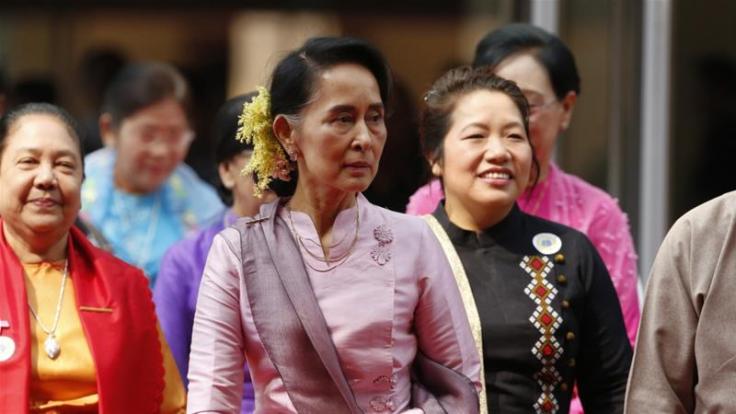
Picture: Aung San Suu Kyi, Burmese politician, 1st State Councillor of Myanmar and Nobel Award Laureate.
This ethnic cleansing and what is right now popularly being referred as Muslim genocide also started and ended in 2013. But at that time few people were aware of what havoc so called Peace Prize Winner Aung San Suu Kyi was playing. But now international media is speaking up. Many countries such as Iran (Hassan Rouhani), Turkey (Recep Tayyip Erdoğan), Maldives, Malaysia, Pakistan (MOFA) and Indonesia have directly condemned the Burma’s atrocities and questioned Suu kyi’s refusal to talk on Rohingya crisis. In UK, MPs in House of Commons also raised their voice against the massacre. International forums such as UN and OIC are still quiet with no formal statement yet released.
On the other hand Bangladesh has refused to rehabilitate the Rohingya Muslims and Indian government is threatening to deport 40,000 Rohingyas which is further creating sense of uncertainty and fear among a small Muslim minority. This small Indo-Aryan minority claims to be the descendants of Arab traders and are present in this region since 15th century. They are deprived of education, health and most importantly national identity and Burmese Government refuses to allot them passports or national identity cards.
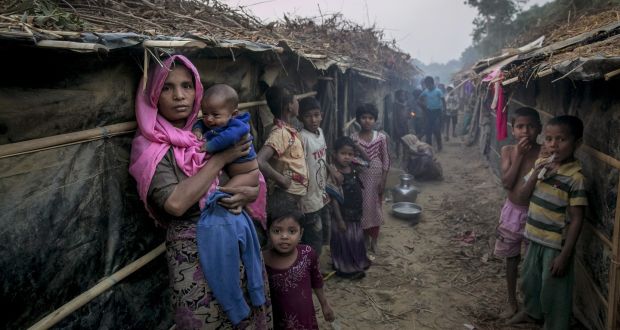
Picture: Rohingya Muslims are most persecuted minority that has no identity neither in Bangladesh nor in Myanmar.
Over 3,035,000 people have signed a petition on Change.org demanding that the Nobel Peace Prize be taken back from Myanmar leader Aung San Suu Kyi for failure to stop violence against the ethnic Rohingya Muslims in the country. With many petitions called for UN to take action against the ongoing apartheid. Nobel Award winner and educational activist Malala Yousafzai also criticised the country and its leader.
Pakistan’s Foreign Minister Khawaja Asif also expressed his concern and said that Pakistan is committed to providing humanitarian assistance to Rohingya Muslims. On the other hand many people in Pakistan – in emotionalism – raised their concerns and demanded Pakistan Army to enter in Myanmar and as well as called to rehabilitate Rohingya Muslims in Pakistan.
That was the introduction and now I would like to share some problems and issues and history related to refugees especially when it comes to Pakistan. According to a statistical report by social scientists, there are 350,000 Rohingyas living in Pakistan. In 1970s during Soviet-Afghan war, thousands of Afghans fled to Pakistan to seek refuge and now according to UNHCR, that number has rised to 1.3 million with approximately 81% settled in Khyber Pakhtunkhwa. According to a report by Dawn News in 2013, NADRA officials were nabbed by FIA for issuing fake identity cards and allotting Family numbers to Afghan refugees which leading to countrywide protests by Pakistani citizens. It is not a myth but a fact that many refugees brought Kalashnikov and drug culture to Pakistan and built illegal slums and settlements which increased crime, extortion and law and order issue in Pakistan and its metropolitan city Karachi with day to day Police raids and encounters in those settlements. Most of them also joined Islamic militant groups such as Tehrik Taliban Pakistan (TTP). Most of them started their business and freely moved from Pakistan to Afghanistan via Chamman Border which raised issues of National Security.
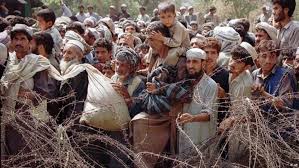
Picture: Afghan refugees fled to Pakistan in 1970s during Soviet-Afghan war.
In 2014, government of Pakistan and Armed forces launched an offensive in North-West Pakistan known as Zarb-e-Azb to curb up the militancy. In that process around 929,859 IDPs from Waziristan were relocated in refugee camps which was the most devastating experience for the citizens to live as refugees in their own motherland. Not only staple food items were allocated but due to harsh weather conditions, Pakistan Army had to accelerate the fight to send the IDPs back as economic burden also rised. Each family was given around Rs35,000 with 6 month food and non-food items when they were sent back home.
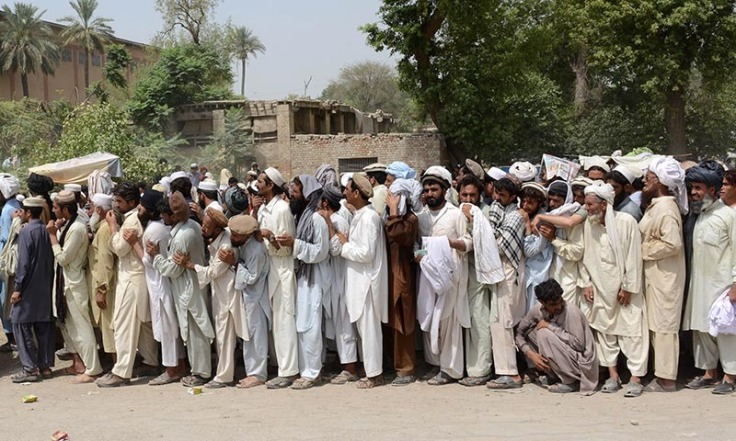
Picture: IDPs from the North Waziristan tribal region queue outside a World Food Programme. Courtesy: DAWN News.
In Pakistan, we don’t have much capacity to treat refugees. Refugees don’t deserve all what they normally face. They deserve jobs, house, cloths, food and a peaceful living. It is not about being selfish towards these refugees but it is about how we can care for them. There are many risks that are involved in settling Rohingya Muslims in Pakistan just like these were involved in other refugee crises.
- Perilous Journey: Obviously when even Press is not allowed to enter Sitwe, Yangon and Rakhine where most of the genocide has been recorded, how would it be possible to bring them. Around 123,000 Rohingyas have fled to Bangladesh in less than a fortnight. Many Rohingya Muslims have died from boat collapse.
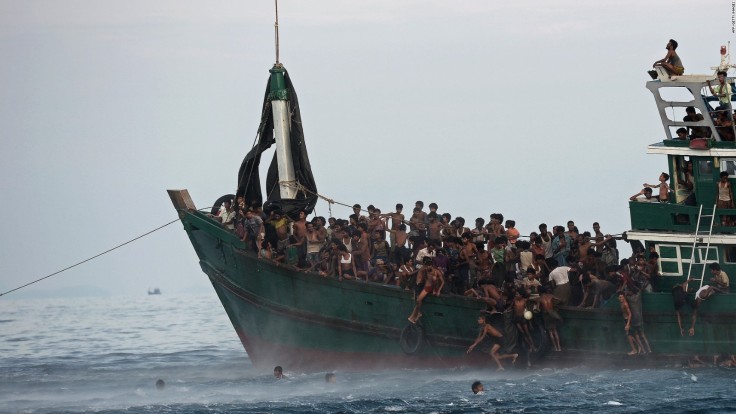
Picture: Rohingya Muslim migrants in hope for a better life fleeing on boats. Many boats have collapsed resulting mass deaths.
2. Camps and temporary shelters: Huge amount of corruption was recorded in the housing scheme project for 2010 flood victims of Pakistan. In much harsh climates as well as number of family members it becomes difficult to live in camps.
3. Human Trafficking: One of the most horrific fact is that many refugees become the victims of human traffickers who then use them for sex trafficking, bonded labour and begging. We can’t expect this for the refugees. Most of their victims are women and small children.
4. Economic Risks: It is a fact that most refugees who apply for asylum or go as refugees needs jobs. Obviously, the government would have to provide them jobs when many citizens are themselves sitting unemployed. They would have to economically support them. In Pakistan, where corruption is a norm, how the government be able to efficiently allocate the scarce resources on them. This would lead to economic burden. But we don’t even know for how much time, refugees will live in Pakistan.
5. Crime: Many refugees in attempt to find jobs become prey to organised crime syndicates who use them for crime and terrorist activities.
6. Sanitation and Sewerage: Even if we accept that the refugees would be allotted with homes in housing schemes, when the sanitation of a metropolitan city is poor then what can we expect in those schemes. How and where the people would dispose of the waste material?
7. Health Risks: Epidemics spread in Pakistan like wildfires. The major reason is sanitation and sewerage. And where all are living in camps with 5-6 people in single camps, obviously diseases like Malaria, Cholera, Typhoid and Dengue are inevitable. Obviously how small medical clinics and camps would help treat pregnant women in camps. Malnutrition and severe climate increased major risks. Will we allow them to suffer in camps under severe climatic conditions especially if the camp is located at high altitude areas? We just can’t rely on WHO (World Health Organisation).
Now I would discuss why Pakistan should not militarily intervene in Myanmar. We know that Pakistan share borders with India and we also know that India is planning to deport Rohingya Muslims back to Burma. We should also keep in mind that a small militant organisation is not involved in this brutal genocide but the whole Burmese Government is involved in this and is even justifying their stance. At this point, any military intervention of armed brigades would lead to a big diplomatic and international crisis. When our own country is politically unstable, how can we jump into a havoc.
The only solution is to politically and economically isolate Myanmar. UN and OIC would have to play a supportive role and would have to end selective support and game of discrimination. UN was formed to end conflicts but sadly UN even under its new general secretary has failed to promote peace. I also believe that Myanmar’s embassies and consulates must be shutdown immediately to create pressure on Suu Kyi’s government. Furthermore their officials must be deported from respective countries and a resolution should be passed in UNGA.
It is not about being selfish, but ethically we should not expect something for others what don’t expect for ourselves. We should stand in solidarity and support Rohingya Muslims irregardless of race or religion.
About the columnist:
Khalid Raza Khan is a BBA (Bachelors of Business Administration) student from Karachi, Pakistan and is a current amateur political analyst, freelance writer and observer covering domestic and international news and affairs.
Khalid Raza Khan can be reached on Twitter at: @iamkhalidraza


Sep 7, 2017 at 10:56 pm
A very illuminating read that promotes pragmatic and logical dialogue! Do write more on this issue, especially the history of the crises.
LikeLiked by 1 person
Sep 8, 2017 at 3:23 pm
Thank you for the appreciation.
LikeLike